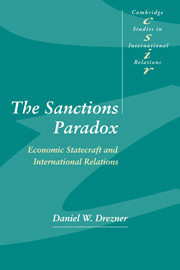Book contents
- Frontmatter
- Contents
- List of figures
- List of tables
- Acknowledgments
- 1 Introduction
- Part I Theory and data
- 2 A model of economic coercion
- 3 Plausibility probes
- 4 Statistical tests
- Part II Economic coercion in the former Soviet Union
- Part III Choosing between carrots and sticks
- Part IV Conclusion
- References
- Index
- Cambridge Studies in International Relations
3 - Plausibility probes
Published online by Cambridge University Press: 15 January 2010
- Frontmatter
- Contents
- List of figures
- List of tables
- Acknowledgments
- 1 Introduction
- Part I Theory and data
- 2 A model of economic coercion
- 3 Plausibility probes
- 4 Statistical tests
- Part II Economic coercion in the former Soviet Union
- Part III Choosing between carrots and sticks
- Part IV Conclusion
- References
- Index
- Cambridge Studies in International Relations
Summary
In all scientific enterprises, the elegant theory must confront the somewhat inelegant facts. Facts in international relations can be slippery. Quantitative data are inexact at best. Qualitative data can be interpreted in multiple ways. This makes testing a difficult process.
This chapter conducts a plausibility probe to see how well the established theories of economic coercion, compared with the conflict expectations model, can explain variations in the initiation and outcome of economic coercion. A plausibility probe is like dipping the first toe in the water. Swimmers want to know if the water is temperate enough to go deeper. Researchers want to know if the empirical climate is friendly enough for more extensive forays. By looking at the existing research, it is possible to see if the evidence fits with existing explanations, or if the conflict expectations model can contribute a better and fuller understanding of economic statecraft.
The first part of this chapter looks at the statistical data sets and studies to compare the conflict expectations model to the alternative set of explanations. The existing sanctions data sets show that the success rate of economic coercion attempts is higher than previously thought. Sanctions are not always fruitful, but there is significant variation in the outcome. The evidence from previous statistical analyses rejects the alternative hypotheses that sanctions are caused by either domestic pressures or the absence of feasible alternatives.
- Type
- Chapter
- Information
- The Sanctions ParadoxEconomic Statecraft and International Relations, pp. 59 - 101Publisher: Cambridge University PressPrint publication year: 1999



